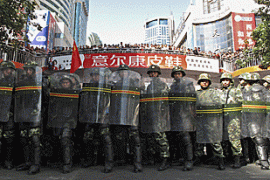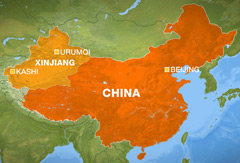Hong Kong reporters condemn assault
Xinjiang officials asked to apologise to three reporters beaten up during the Urumqui unrest.

At a news conference a few days after the incident, Hou Hanmin, a Xinjiang government spokeswoman, voiced regret but blamed journalists for inciting unrest.
Mak Yin-ting, chairwoman of the Hong Kong Journalists Association (HKJA), said media workers were angry over the “outrageous and blatantly false” allegations against the journalists.
“This is a violent trampling on press freedom,” she said.
“It is not a single incident. Even last year, lots of our journalists were beaten while reporting in China. The situation is getting worse now.”
‘Full investigation’
The Foreign Correspondents’ Club of Hong Kong, which co-organised the protest, said Beijing should conduct a full and impartial investigation into the affair and publish an uncensored report of its findings.
| Xinjiang and the Uighurs |
|
|
“It is the first time the entire spectrum of the Hong Kong society, including senior government officials and National People’s Congress delegates, have condemned such treatment of reporters,” Tom Mitchell, the club’s president, told the AFP news agency.
“I think, as a result, the Central Government will take notice.”
The protesters, who included some of the territory’s pro-democracy politicians, marched to the Central Government Liaison Office and tied red ribbons at the entrance.
Pro-Beijing political parties were not represented at the march but have voiced condemnation of the Xinjiang authorities over the incident.
Local delegates to the National People’s Congress have urged Beijing to investigate the matter.
Hong Kong, which was returned to Chinese rule in 1997, continues to regard freedom of the press as a cornerstone of society.
Ethnic relations in Xinjiang have grown increasingly strained in recent years, with many Uighurs resentful at the migration of millions of Han Chinese into what they see as their homeland.
The Uighurs say the Han have unfairly benefited from the mineral wealth of Xinjiang, a strategically vital Central Asian region with significant oil and gas deposits.
The Han often stereotype Uighurs as lazy, more concerned with religion than business, and unfairly favoured by quotas for government jobs and university places.

 Xinjiang is officially an autonomous region but in practice it is tightly controlled by Beijing. It is sparsely populated but has large reserves of oil, gas and minerals.
Xinjiang is officially an autonomous region but in practice it is tightly controlled by Beijing. It is sparsely populated but has large reserves of oil, gas and minerals.